Demand for Removal of Barriers Along Dublin’s Grand Canal: Fresh Protest Seeks Accessibility
A new wave of activism is sweeping through Dublin as protesters gear up for another demonstration this weekend against the controversial fencing that has recently been erected along the Grand Canal. The Take Back Our Spaces Coalition, comprised of various community groups including the Dublin branches of the Communities Action Tenants Union (CATU), People Before Profit Dublin, and Social Rights Ireland, is spearheading the rally. Scheduled for August 17 at 1pm outside the Department of Integration on Baggot Street, the protest aims to challenge the barriers that have been put in place, restricting access to the canal.
The coalition has aptly named the protest “Home Not Fences,” emphasizing the need for the government to prioritize providing adequate accommodation for International Protection Applicants rather than implementing physical barriers. In a statement announcing the upcoming demonstration, a spokesperson for the coalition expressed concerns about the ongoing harassment and exclusion of homeless individuals living along the Grand Canal. The spokesperson highlighted the destructive actions of law enforcement in dismantling makeshift homes and the installation of hostile architecture in the form of fencing by Waterways Ireland, which has effectively limited public enjoyment of the canal.
The root cause of the issue, according to the coalition, lies in the systemic failures of government policies and the Department of Integration’s neglect in fulfilling its duty to house those most vulnerable in society. The housing crisis, exacerbated by political decisions over the years, has forced individuals to resort to living in tents along the canal. The coalition’s demand for the removal of barriers is a call to action against the injustices faced by homeless individuals and a plea for a more compassionate and inclusive approach to urban planning.
Protesters Take Matters into Their Own Hands
On July 18, a bold act of defiance unfolded along the Grand Canal as protesters took matters into their own hands and tore down the barriers erected by Waterways Ireland. The demonstration, which drew around 200 participants in Portobello, was a powerful display of collective resistance against the fencing that had been put in place to deter people from setting up tents along the canal. The action sent a clear message to authorities that the community stands united in their demand for unfettered access to public spaces.
A spokesperson for Waterways Ireland acknowledged the ongoing costs associated with maintaining the fencing, estimated at approximately €30,000 per week, and described the current situation along the canal as less than ideal. While emphasizing the organization’s commitment to prioritizing health and safety concerns, the spokesperson acknowledged that the temporary fencing was never part of the original plan. Waterways Ireland expressed a willingness to engage with local communities along the canal to address their concerns and explore options for fully reopening the amenity without compromising safety or public health.
Despite the challenges posed by the current situation, Waterways Ireland remains optimistic about finding a solution that balances the need for security with the desire to create welcoming public spaces. The organization is actively considering various options, including expediting a landscaping and biodiversity program to enhance the areas in question. While the timeline for implementing these measures is still under consideration, Waterways Ireland is hopeful that work will commence by October, with a willingness to expedite the process if feasible.
Community Voices and Solidarity
The outpouring of support from local communities and advocacy groups has been instrumental in amplifying the voices of those affected by the fencing along the Grand Canal. Residents, activists, and volunteers have come together to stand in solidarity with homeless individuals and marginalized communities, demanding justice, equality, and accessibility for all. Through grassroots organizing and community engagement, the movement against barriers has gained momentum, drawing attention to the underlying social issues that contribute to homelessness and exclusion.
As the protests continue to garner public attention and support, the conversation around urban planning, public spaces, and housing policy in Dublin has been reignited. The need for a more inclusive and compassionate approach to addressing homelessness and social inequities is at the forefront of the discourse, challenging policymakers and stakeholders to prioritize the well-being of all citizens. The call for the removal of barriers along the Grand Canal is not just about physical structures but about dismantling systemic barriers that perpetuate inequality and marginalization.
Looking Towards a More Accessible Future
As Dublin grapples with the complexities of urban development and social inclusion, the fight for accessible public spaces and affordable housing remains a pressing issue. The ongoing protests against the fencing along the Grand Canal serve as a testament to the resilience and determination of communities to challenge injustice and demand change. By amplifying the voices of those most impacted by discriminatory policies and barriers, activists and advocates are paving the way for a more inclusive and equitable future for all residents of Dublin.
The path towards a more accessible future requires collaboration, empathy, and a commitment to social justice. It necessitates a reevaluation of existing policies and practices that perpetuate exclusion and marginalization, and a reimagining of urban spaces that prioritize inclusivity and diversity. As the protests continue and community voices grow louder, the demand for the removal of barriers along the Grand Canal symbolizes a broader movement towards a city that embraces all its residents, regardless of their socio-economic status or background.
In conclusion, the ongoing activism and advocacy surrounding the fencing along Dublin’s Grand Canal represent a pivotal moment in the city’s history, where communities are coming together to challenge systemic injustices and promote a more accessible and inclusive urban landscape. By standing in solidarity with those most affected by barriers and exclusion, residents are not just demanding physical access to public spaces but advocating for a more compassionate and equitable society for all. The fight for accessibility is far from over, but the momentum generated by these protests signals a growing determination to create a city that values the well-being and dignity of every individual.












